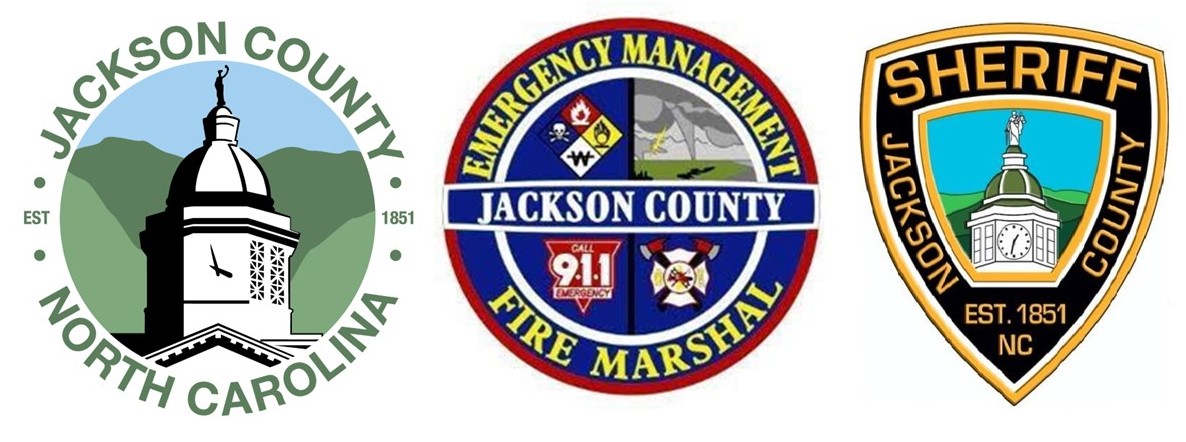
828-631-HELP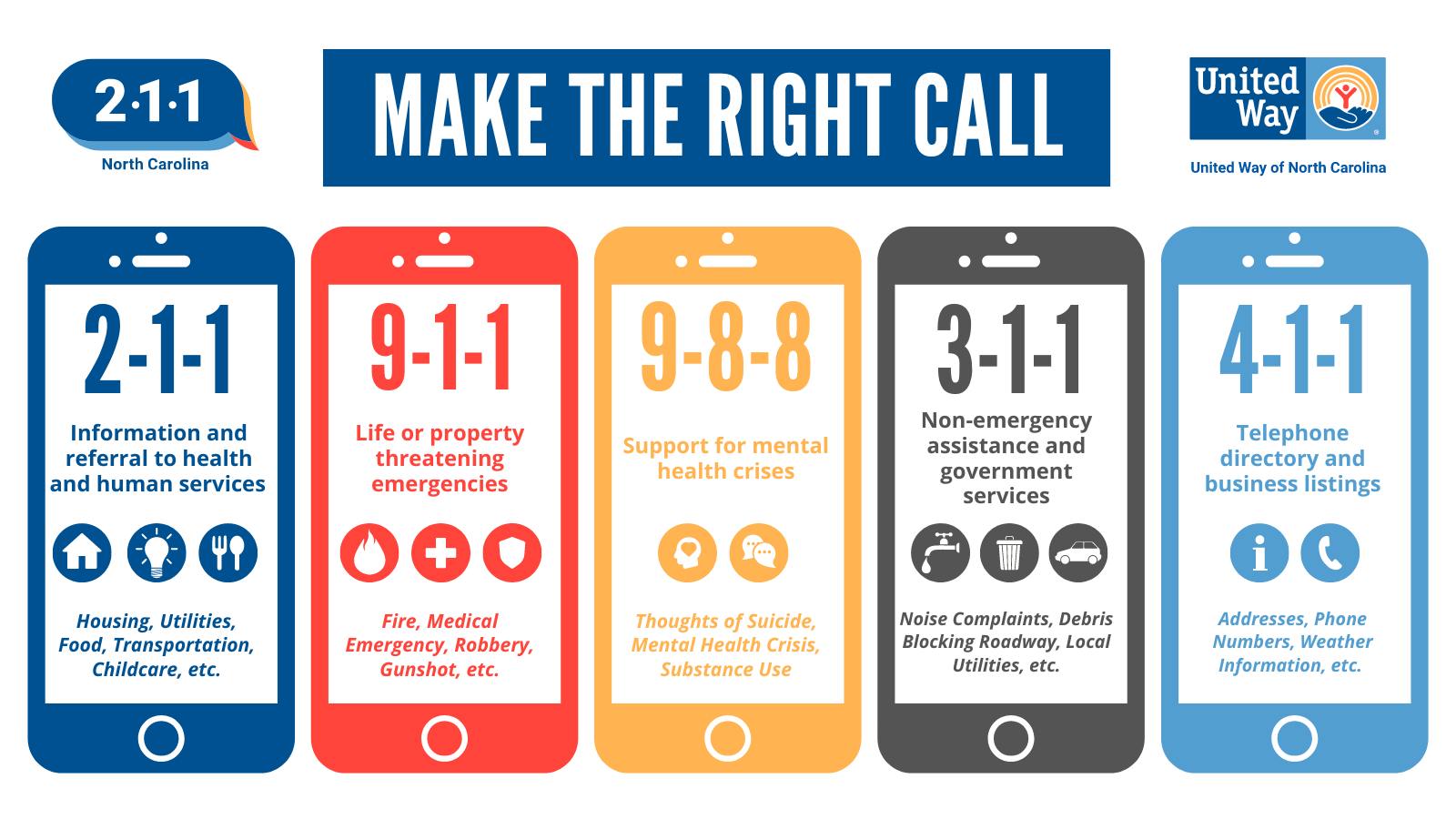
Disaster Recovery Center (DRC)
A FEMA Disaster Recovery Center is set-up in Jackson County. The DRC is open to anyone impacted by the storm no matter the county. Representatives are on hand to assist in helping individuals walk through the process of applying for FEMA Assistance.
Location: Jackson County Annex Building, 198 WBI Drive, Sylva
Hours: Saturday-Sunday, 8 a.m.-7 p.m.
The Jackson County DRC officially opens on Saturday, Oct. 12 at 1 p.m. You do not need to go in person to sign up for FEMA Disaster Recovery Assistance. You can also sign up by calling 1-800-621-3362 or visiting www.disasterassistance.gov.
FEMA Assistance - 1-800-621-3362
Affected individuals residing in counties affected by the disaster can now apply for assistance with FEMA in the following three ways:
¿Necesita ayuda después de un desastre? Le podemos ayudar a solicitar asistencia por desastre de FEMA y guiarlo a otros recursos para ayudarle a recuperarse. https://www.disasterassistance.gov/es
The Disaster Assistance website is available in 9 languages.
Renters or homeowners who suffered any damage or loss should apply for assistance. There is no need to wait for an insurance inspection. Before survivors call or go online, they should gather the following basic information:
If an inspection is needed to determine eligibility, the inspector will usually make an appointment within five days. Survivors can clean up before the inspection. They should take pictures of the damage and property that had to be removed. If survivors were displaced from their home and incurred hotel expenses, or purchased clean-up or repair materials, they should save those receipts because these MAY be eligible for reimbursement. All applicants will receive a letter from FEMA regarding their request for federal assistance.
If you have insurance, you should file a claim with your insurance company when you apply for FEMA assistance. FEMA cannot aid with losses already covered by insurance. If your insurance does not cover all your losses or is delayed, you may be eligible for FEMA assistance regarding your unmet needs.
FEMA Individual Assistance FEMA Disaster Assistance
Transitional Sheltering Assistance (TSA) - You must have a FEMA application number and approval from FEMA to participate in the Transitional Sheltering Assistance (TSA). If you have questions about TSA or need help locating a hotel, you may also call the FEMA Helpline at 1-800-621-3362, 7 a.m. to 10 p.m. (in your time zone), 7 days a week. Hours may be longer during high disaster activity.
Unemployment Disaster Assistance - The Disaster Unemployment Assistance (DUA) program provides temporary benefits to people who, as a result of a major disaster, lost or had their employment or self-employment interrupted.
Appeal a FEMA Decision - If you disagree with FEMA’s decision, you may appeal. It must be submitted within 60 days of the date of the decision letter. If you have questions regarding the letter you received or how to file an appeal, call the FEMA Helpline at 800-621-3362.

Disaster Distress Helpline - 1-800-985-5990
There is no right or wrong way to feel in response to the trauma of a hurricane. If you have been impacted by the storm and need someone to talk to, call or text the Disaster Distress Helpline at 1-800-985-5990. Help is also available to anyone, anytime in English or Spanish through a call, text or chat to 988. Learn more at 988Lifeline.org.
Pharmacy Information
The NC Board of Pharmacy has compiled a list of pharmacies in Western North Carolina that are operating and serving patients. https://www.ncbop.org/emergencyoperatingpharmacieshelene.html Emergency refills of prescription medications are permitted. Make sure to bring a photo ID and a prescription bottle.
Disaster Food Assistance
WIC Information for People Impacted by Hurricane Helene
Many WIC participants have been impacted by Hurricane Helene. Families participating in WIC who may have relocated to a new area can go to any NC WIC agency to have a new eWIC card issued, or to request replacement of breastfeeding supplies, breast pumps, and food purchased with current WIC benefits and lost due to Hurricane Helene.
Hurricane Helene Food and Nutrition Services (FNS) Flexibilities
Disaster-SNAP - Requested by the NCDHHS
Disaster Food Assistance is available at https://www.ncdhhs.gov/divisions/child-and-family-well-being/food-and-nutrition-services-food-stamps/hurricane-helene-food-and-nutrition-services-fns-flexibilities
Small Business Administration Disaster Assistance (SBA)
Who can apply for an SBA disaster loan?
How to use an SBA disaster loan?
Types of available SBA disaster loans:
Debris Collection
Hurricane Helene Debris Collection will take place throughout Jackson County. Please follow the guidelines for debris pickup. Items not placed properly can not be picked up. Please place all debris curbside. Do not block the roadway. Only Vegetative and Construction & Demolition debris will be picked up by Jackson County's contractor. All items must be separated. Please do not put appliances, household trash and/or hazardous materials curbside. Do not place any debris on top of exposed cables or lines.
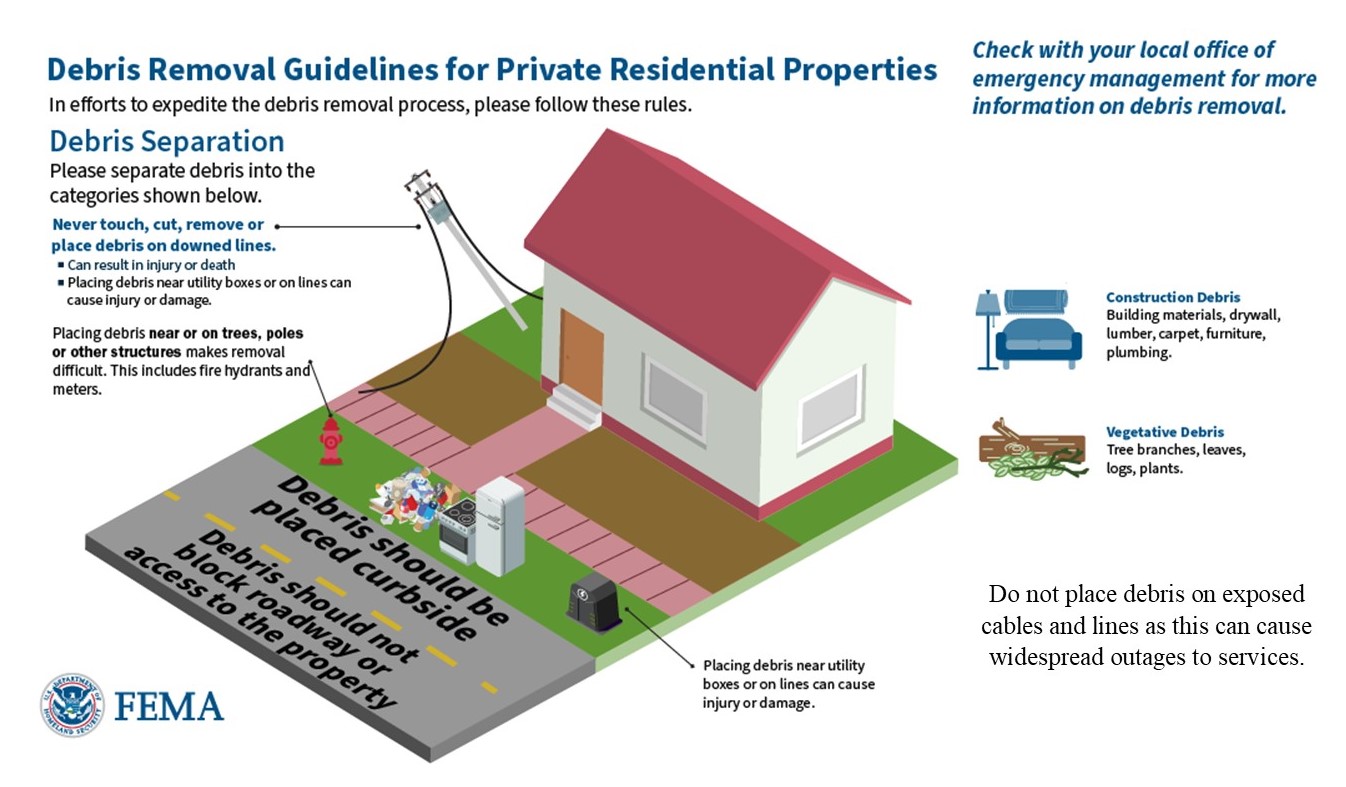
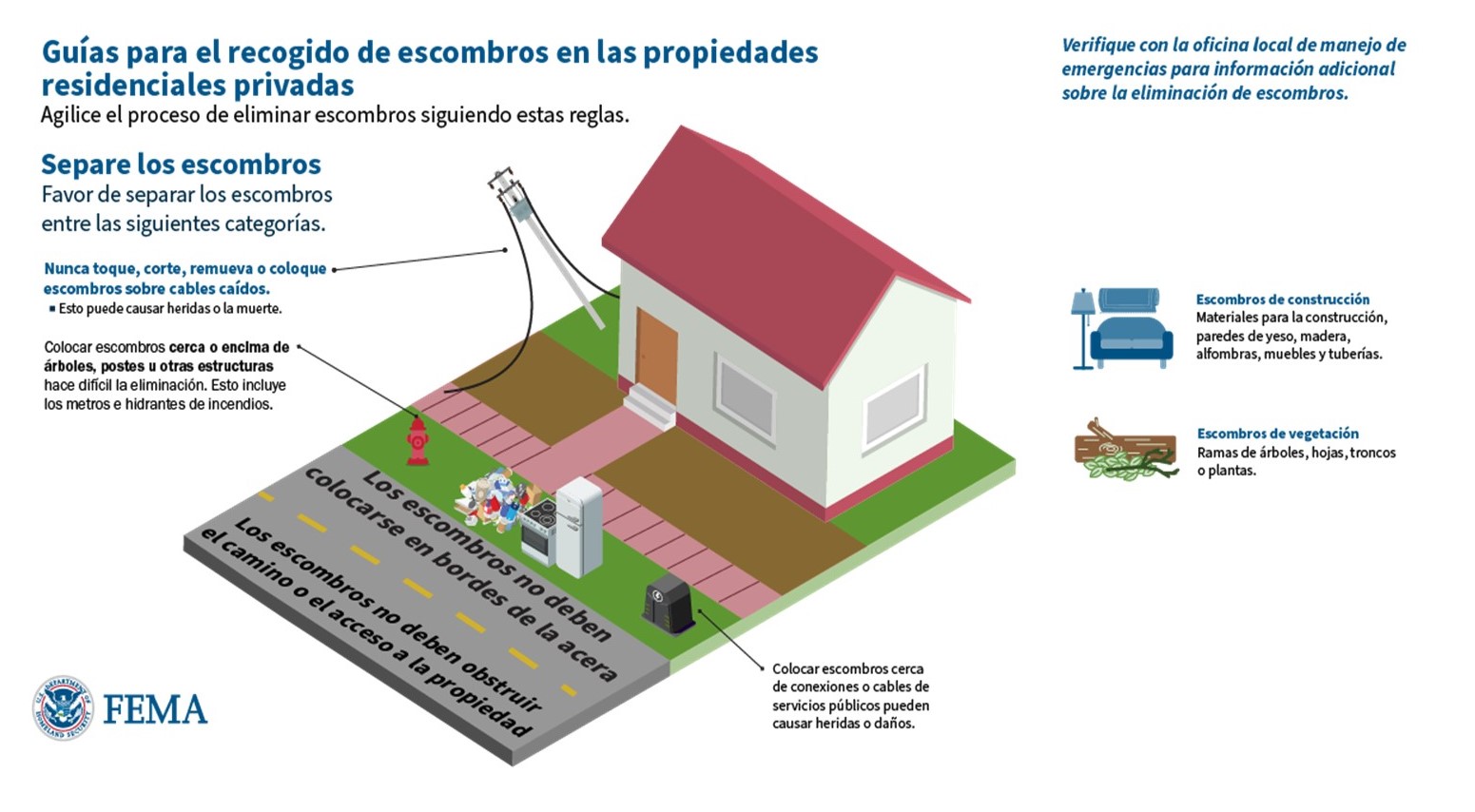
NC Emergency Management Shares Debris Cleanup Guidelines
RALEIGH — In the coming days and weeks, clearing debris will become an important focus of our recovery efforts. That will include separating debris into the following categories: construction debris and vegetative debris. Debris needs to be separated in order to be properly collected.
If Hurricane Helene caused damage to your home or belongings, make sure to document it. This is critically important in getting reimbursed. Take photos before you begin cleaning up. Make a list of damaged or lost items and gather receipts. Doing this helps speed up the process with insurance and other assistance programs, and ensures you get properly compensated. Before you start the clean-up process, remember:
•Wear PPE such as long pants, goggles, gloves and sturdy shoes.
•Stay off damaged structures.
•Be aware that snakes or other hazardous animals could be present.
Debris should be placed curbside and not block the roadway or access to the property. Place debris away from trees, poles or other structures (e.g., fire hydrants, meters, etc.) to make removal work easier. Contact your local municipality for collection schedules.
•Never touch, cut, remove or place debris on downed power lines. As power is restored, this could cause damage, serious injury or death. If using a chainsaw during debris removal, please remember to:
o Avoid contact with power lines until the lines are verified as being de-energized.
o Always cut at or below waist level to ensure that you always have full control over the chain saw.
o Be sure that other people are a safe distance away from anyone operating a chainsaw. For example, for users taking down a tree, bystanders should be at least two tree lengths away.
o As you work, clear the area where you are cutting of possible hazards such as cut trees, nails or cables to make the area safer to work and create an escape path in case of emergency.
o Take extra care in cutting trees or branches that are bent or caught under something else, as kickback can cause serious injury.
Call your local fire department to inspect or remove chemicals, propane tanks and other hazardous materials. If you suspect debris contains toxic substances, seal them in plastic bags to prevent them from becoming airborne. Always wash your hands with soap and water after cleaning up debris, especially after handling items contaminated by floodwater or sewage. If you get your drinking water from a private well and your area has experienced flooding, make sure its water is safe before drinking. Learn more.
•Do not to block utility boxes with debris, as this can cause injury or damage.
•If you find any visible cables while clearing debris, wait for professionals to handle them.
•Never burn trash, lumber, tires, plastics or other man-made materials.
•Be wary of anyone who approaches you offering debris removal or water testing services. Scammers often use disasters as an opportunity to take survivors’ money.
•Do your research before doing business with a company. Check with the Better Business Bureau to see if they have complaints against the company. Be sure companies you do business with are licensed and insured.
•If they want you to pay in full up front, walk away.
•If you need your water tested, you can find state-approved water testing labs through the NC Department of Environmental Quality’s by visiting their website or by calling 877-623-6748.
•If you believe you are the victim of a scam, report it immediately to your local police or sheriff's department or contact North Carolina Attorney General’s Office at 877-566-7226 or visit www.ncdoj.gov/protecting-consumers.
Resources
https://www.fema.gov/node/debris-removal-guidelines
https://www.fema.gov/fact-sheet/private-property-debris-removal
https://community.fema.gov/ProtectiveActions/s/article/Hurricane-Clean-Up-Your-Property-Safely
https://www.cdc.gov/natural-disasters/safety/chain-saw-safety.html
When approaching a mold removal and cleaning project, one of the most important considerations is the potential risk of mold exposure. Mold counts in the air can be 10 to 1,000 times higher than normal during a removal or cleaning project. Because of the potential health risks from mold exposure, it is advisable, particularly for larger (greater than 30 square feet) contamination situations, to contact a mold remediation contractor. Individuals who have allergies, asthma or respiratory disease; are immunosuppressed; or have other health problems should not take part in a mold removal/cleaning project or be in the general area of the project.
To minimize exposure and/or potential health risks from conducting a mold remediation project, take the following precautions:
Mold Fact Sheet: https://epi.dph.ncdhhs.gov/oee/docs/mold_factsheet_10132023-fin.pdf
Volunteers
We have been overwhelmed at the outpouring of community members wanting to volunteer their time. At this time, Jackson County does not have any further volunteer opportunities available. For those already registered with Jackson County, we will continue to reach out as volunteer opportunities arise. Volunteers are needed in other areas. The best way to get connected to opportunities is by signing up to volunteer with a Voluntary Organizations Active in Disaster (VOAD) at https://www.ncvoad.org/volunteer/.
Supply Donations
If you would like to donate supplies, you may do so at area non-profits. Please contact them in advance to ensure they have the resources available to receive the supplies.
Financial Donations
Many people have reached out to Jackson County and would like to provide financial-based assistance. The money collected through these organizations will be used to help provide immediate necessities while helping the overall long-term effort to continue to provide the numerous essentials associated with ongoing relief efforts.
If you would like to donate financial resources, we have identified the following funds to distribute resources to our community:
Sign up today for CodeRED
CodeRED is a type of reverse 9-1-1. This system allows County Officials (Emergency Management) the ability to deliver pre-recorded telephone notification/information messages to targeted areas, or the entire County concerning manmade, or natural emergencies.
State of Emergency
Jackson County declared a State of Emergency on Sept. 26, 2024 and amended it to restrict fuel on Sept. 30, 2024.
Oct. 7, 2024 Jackson County rescinds the restriction on the sale and purchase of gasoline.
Schools
Jackson County Public Schools: Schools will return to normal operations on Monday, Oct. 7, 2024.
Western Carolina University: On Monday, Oct. 21, 2024, the campus will resume normal operations, unless conditions warrant an extension of reduced operations.
Southwestern Community College: SCC will reopen on Oct. 7, 2024.
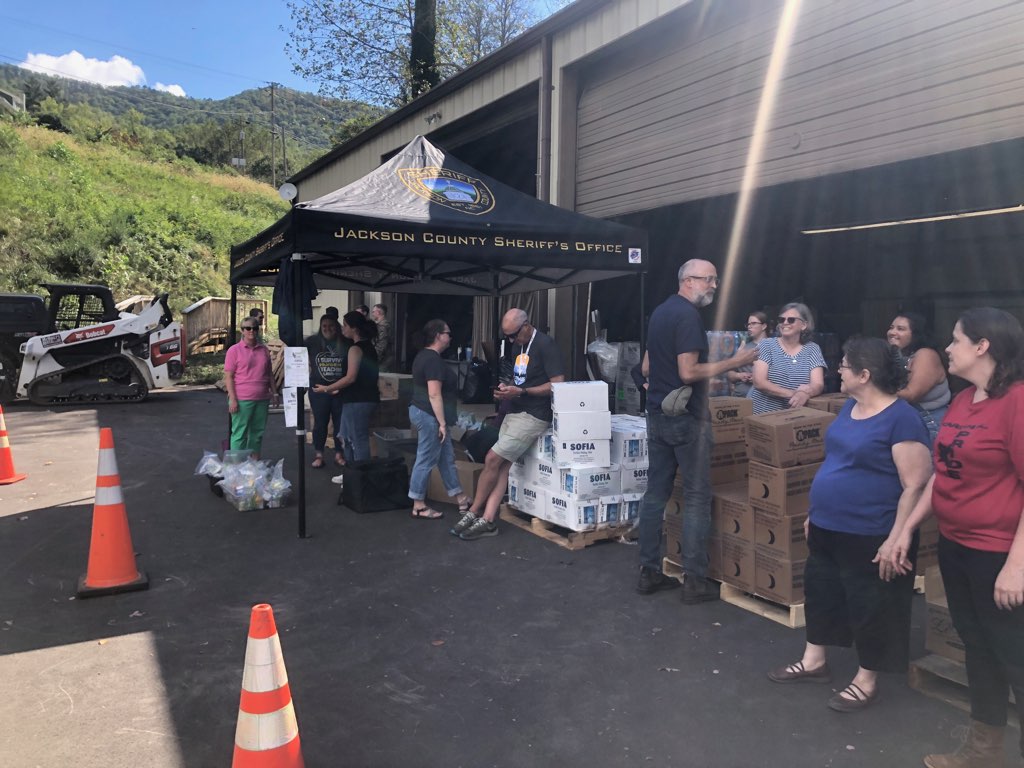 Distribution sites across Jackson County provide water and MREs in the days after Hurricane Helene.
Distribution sites across Jackson County provide water and MREs in the days after Hurricane Helene.